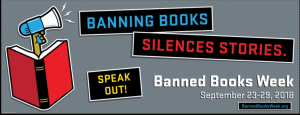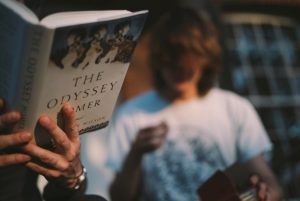Freedom to read is the message in Banned Books Week
By administrator | 13 September 2018

American Library Association Banned Books Week is 23 – 29 September 2018. Banned Books Week is the annual celebration of the Freedom to Read and highlights the value of free and open access to information.
Libraries and others in the book community use Banned Books Week to show support of the freedom to seek and express ideas, even those some consider unorthodox or unpopular. The 2018 theme is “Banning Books Silences Stories”.

The Odyssey by Homer (note the link includes access to 15 historical banned books). This ancient Greek epic poem was banned in the year 35 because of its "Greek ideals of freedom," which Caligula did not approve of. Photo by Tbel Abuseridze on Unsplash
Professional statements
The following statements uphold the core values of librarianship including equity, justice and the support of human rights. It is the role of libraries to promote the free flow of information and ideas in the interests of all Australians and a thriving culture and democracy.
The IFLA Statement on Libraries and Intellectual Freedom
Statement on free access to information (Alia)
Further information can be found in the Library Standards some of which are currently under review.
Australian censorship
In Australia censorship is called classification and is handled under the Classification Act 1995. Only certain types of prohibited pornography, serious encouragement of crime, instructions on suicide and seditious literature is banned from publication in Australia. (Wikipedia)
Banned books
In Australia, Lady Chatterley's Lover was banned between 1929 and 1965. Other banned books include God's Little Acre, Catcher in the Rye, Appointment in Samarra, Butterfield 8, The Ginger Man, Tropic of Cancer, Tropic of Capricorn, Another Country, Naked Lunch, Kama Sutra and The Thin Red Line–all or most bans have since been lifted.
The Top Ten Challenged Books of 2017 in America includes: The Kite Runner by Khaled Hosseini, To Kill a Mockingbird by Harper Lee; and And Tango Makes Three by Peter Parnell.
Show your community you support their right to read.
Comments
Your email address will not be published.
We welcome relevant, respectful comments.